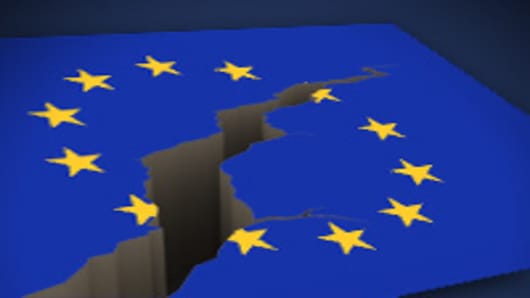Asked to sum up the European Union debt crisis in a single sentence over the weekend, I was forced to go with “death by a thousand cuts.”
What has become clear to anyone who is not actually running a euro zone member state or a central bank in Frankfurt is that reacting to yesterday’s crisis simply leads to tomorrow’s crisis.
Take last month's EU agreement on a second rescue package for Greece as an example.
The agreement was aimed at finally drawing a line under the threat of contagion (again); EU heads of state agreed to allow the European Financial Stability Fund (EFSF) to lend to Greece, Ireland and Portugal for longer time frames at lower interest rates.
The EFSF would also be able to intervene directly in secondary markets and lend directly to banks while offering precautionary loans to recapitalize countries which had yet to ask for a bail-out.
That means Italy and Spain, but within 24 hours of the new deal being hailed as exactly what was needed to stop the rot, both countries' borrowing costs where rising again and have not stopped doing so since.
With money pouring out of both Italy and Spain, analysts are beginning to ask if a new policy is needed just days after the last one was finally agreed.
“Given that the debt markets of Spain and Italy have largely moved in lockstep since mid-July, it makes sense to look for a common cause for this loss of faith among investors rather than looking for country-specific catalysts,” Simon Derrick, the head of currency research at Bank of New York Melon, said in an interview with CNBC.
“As such, it seems reasonable to suppose (given the timing of the latest moves) that the proximate cause of this loss of confidence was the July 21st deal itself,” Derrick added.
EFSF Not Rich Enough
The problem, as Derrick points out, is that the EFSF does not have enough funds to deal with Italy or Spain, let alone both.
“Even in the best of times, these latest developments within the euro zone would likely have proved a threat to investor confidence,” said Derrick.
“However, coming after a seven-month period that has seen one truly dramatic piece of news follow swiftly on the heels of another while global growth has begun to show unmistakable signs of slowing, the concern is that this could help spark a retreat from risk in a wide range of markets,” he added.
"It feels as if the past few days have seen global markets reach a tipping point of sorts. We hope we are wrong," Derrick also said.
On Wednesday Jean-Claude Juncker, the chair of the euro group, and Giulio Tremonti, the Italian finance minister, meet in Luxembourg to discuss the sell-off of Italian sovereign debt and stocks and could be forgiven for thinking if only our peers had listened to us in December.
Late last year both men wrote in the Financial Times that the time had come for the launch of a European bond and their words make interesting reading after 7 more months of debt crisis.
“Europe must formulate a strong and systemic response to the crisis, to send a clear message to global markets and European citizens of our political commitment to economic and monetary union, and the irreversibility of the euro,” Juncker and Tremonti wrote.
“This can be achieved by launching E-bonds, or European sovereign bonds, issued by a European Debt Agency (EDA) as successor to the current European Financial Stability Facility. Time is of the essence.”
The plan, which proposed the EDA should finance up to 50 percent of issuances for EU members and 100 percent for those with no access to the market, was rejected out of hand by German Chancellor Angela Merkel who knew the resultant rise in German borrowing costs would not be taken well by German voters.
The problem is that if we have crossed a tipping point as Derrick suggests, then there is very little chance of German voters being happy. Surely better to come up with a plan that will finally allow the EU to get ahead of the debt crisis rather await a slow, painful crisis that resembles torture in Imperial China or an album by a Belgian band.



